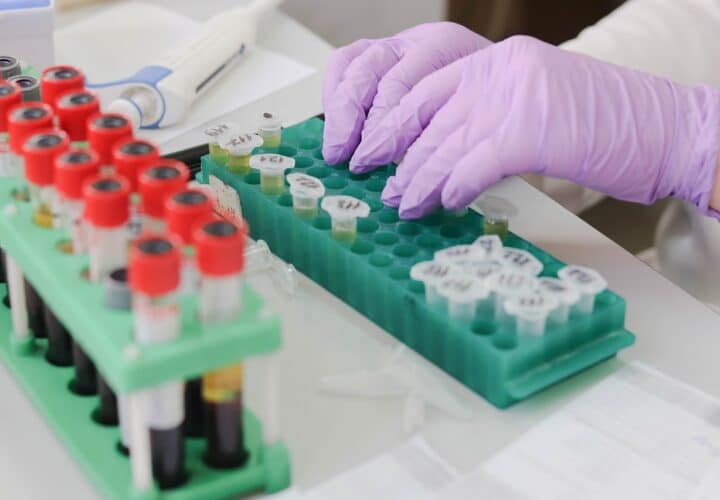The Alzheimer’s Drug Discovery Foundation (ADDF) recently awarded $3.5 million to researchers developing early detection tests for Alzheimer’s. A portion of that award went to French company Amoneta Diagnostics for a promising blood test their researchers have been developing that could detect mild cognitive impairment (MCI) and early Alzheimer’s disease.
- Unlike other Alzheimer’s detection tests like a PET scan or lumbar puncture that look for a buildup of beta-amyloid plaques or tau, toxic proteins often found in Alzheimer’s patient’s brains, this test looks at ribonucleic acids (RNA) in the blood
- Preclinical studies have shown that the test is 100 percent accurate in detecting Alzheimer’s disease
Olivier Danos, vice president of the executive board and scientific advisor of FIRALIS SA, the mother company of Amoneta Diagnostics, speaks about the science behind the test, its potential for detecting Alzheimer’s in early stages, as well as the ethical dilemma that comes with using the test for early detection.
How Is This Alzheimer’s Blood Test Different than Other Early Detection Tests?
Being Patient: We’ve covered a lot of companies that are getting into the early diagnostics of Alzheimer’s disease. How far away are we from going to market with one of these tests?
Olivier Danos: Our plan is to go to market within a couple of years. We’re planning to go on the European market in 2021 and to launch the test in the United States the following year. We’re finishing reviewing our data and we just need to finish up with the production of test kits and then this will be available. We have prototypes we’ve been testing in the clinic on patient samples already, but the real product will take a couple of years to become available to the public.
Being Patient: We know that beta-amyloid plaques, one of the first hallmarks of Alzheimer’s disease, appear long before we ever see a symptom of Alzheimer’s. What exactly are you looking for in the blood to indicate that an early stage of Alzheimer’s may be in place?
Olivier Danos: Our kit comes from a discovery we made about certain nucleic acids, RNA, that you can find in the blood. If you are able to find them and characterize them, then you can show that some of them are very specifically present in people with Alzheimer’s disease, and sometimes in people with very early stage Alzheimer’s disease.
The technology we have allows us to look very precisely at differences in the blood. We can look at thousands and thousands of different RNAs and specific groups and see where they are, and whether they’re over represented or underrepresented. We can have an identification card of a given blood sample and we can diagnose something like Alzheimer’s disease in that sample. This is our goal, this is what we’re trying to develop.
The Accuracy of a Blood Test
Being Patient: What have your tests found in terms of accuracy?
Olivier Danos: We’ve identified some of these long non-coding RNAs that are varying all the time in Alzheimer patients, and now the test looks only at those very specific ones. So, the accuracy of the test, the prediction, is basically 100 percent. This is very clear-cut, it’s not a diagnostic where you’re going to have a 50/50 chance. This is what we’re in the process of demonstrating in our clinical trial.
Being Patient: The means by which we detect signs of Alzheimer’s disease today are either through cerebral spinal fluid or a PET scan. Interestingly enough, those two tests look for plaques and tangles, but could a blood test determine whether someone may develop Alzheimer’s before plaques even start forming in the brain?
Olivier Danos: Yes, because it’s diagnostic in terms of looking for a known target of Alzheimer’s disease, something that goes wrong with the system. When the disease kicks in, it triggers many, many things—the cells become abnormal, neurons start to degenerate—and the whole landscape of long non-coding RNA radically changes. It’s not much of a surprise that when a cell is not feeling well, everything changes in there. What’s surprising is that in the case of Alzheimer’s disease, it always changes in the same way.
Why Would Someone Want to Take a Blood Test for Alzheimer’s?
Being Patient: It helps researchers to know and identify early candidates with Alzheimer’s, but what does this test mean for someone who has a family member with Alzheimer’s? At what age would people get tested for signs of Alzheimer’s in their blood?
Olivier Danos: Once we have a treatment that takes care of a good proportion of patients, such a test should be done very early on as a routine in people in their 20s, 30s or 40s, just as you measure cholesterol in people. You measure cholesterol and if it’s high, you put them on statins, and you do that even when they’re young. If they’re okay, you wait a couple years. This kind of test, if there is a treatment, will be part of a routine follow-up of the general population.
However, we’re getting into a bit of an ethical problem of having a test without necessarily a treatment behind it. Tests exist for other neurodegenerative diseases, like Huntington’s disease for example: You have a genetic test for that, so you can have a 100 percent predictive test for whether you’re going to have Huntington’s disease in the next 20 or 30 years, depending on your age. But there’s no treatment for it, so doctors are not going to prescribe that test for you.
So, there are two different things to consider: One is how you deal with it in terms of public health, and the other is the difficult decision of knowing about it. Some people would rather not know in the absence of treatment, and it’s everyone’s decision.






For someone like myself with a diagnosis of Mild Cognitive Impairment based on memory
problems, can you recommend a test for Alzheimers?
Kind regards
Tony Carey
I have a P Tau 217 Labcorp result of 0.11. What does that really mean?
Very interesting developments. I lost my husband of 50 years with Alzheimers.
We’re sorry for your loss, Anne. Thank you for being part of our community and for sharing a piece of your journey with us.
where can I be tested for Alzheimers using the RNA blood test? This is the most optimistic testing news I have heard. I want the peace of mind knowing I do not have Alzheimers or I want to know I have it so I can be prepared and perhaps delay the onset. I would also be interested in a trial. Keep up the good work!!